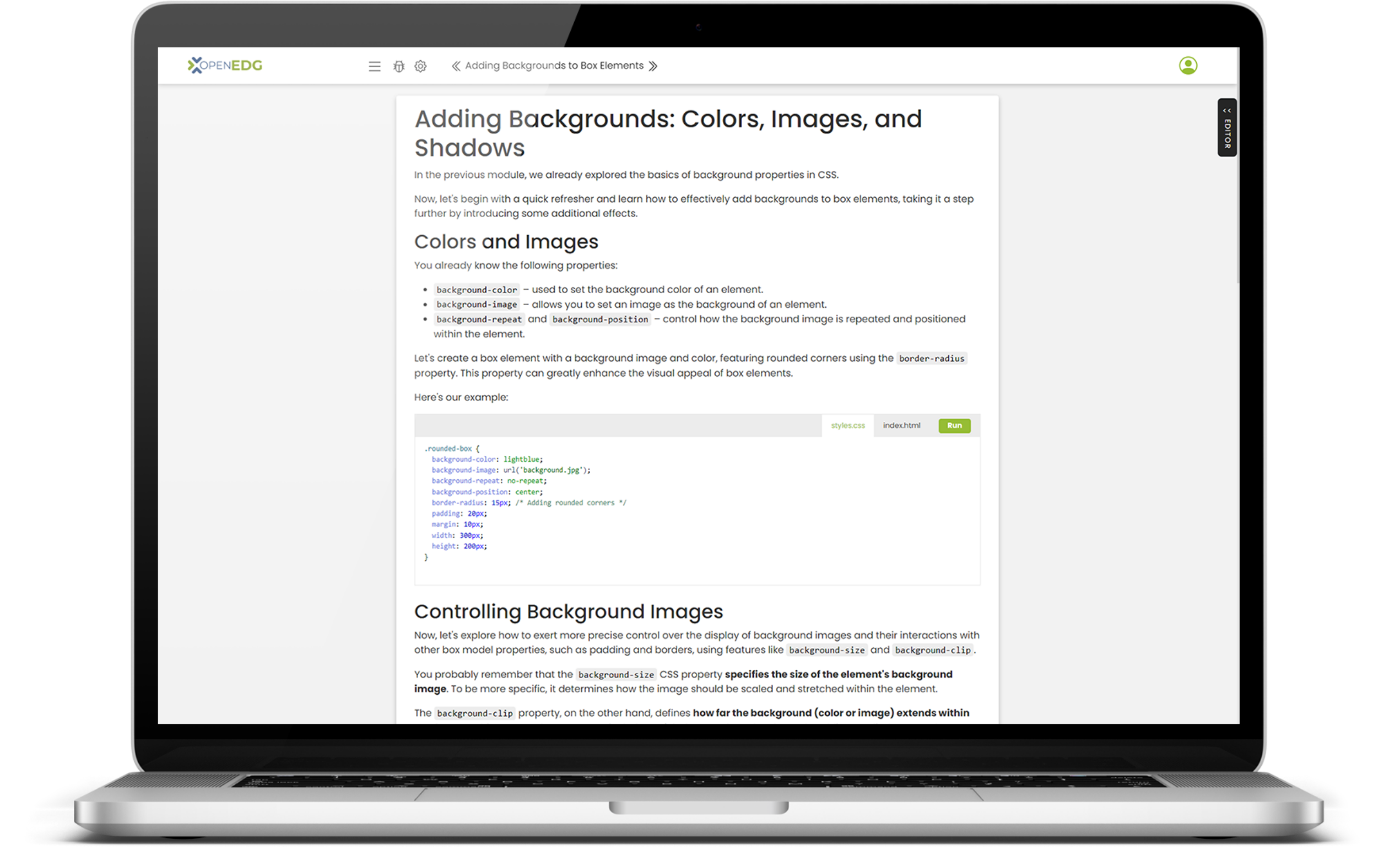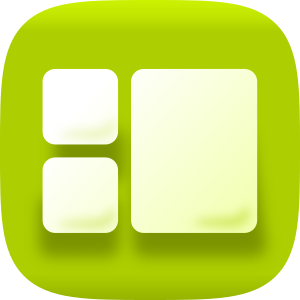Courses
All our courses cover both theoretical and practical concepts that are essential for interacting with real-life programming tasks and situations. They contain quizzes, tests, interactive assessments, and lab exercises that facilitate the understanding of programming concepts and the conversion of knowledge into practical skills. They have been designed and reviewed by experienced faculty and industry professionals, with the goal of meeting current market trends, and equipping the learner with a handset of skills for careers in software development, IT, and related technologies.
The courses are aligned with industry certifications which help to validate programming skills and gain recognition for programming expertise. They cover all the levels of programming language proficiency: entry, associate, and professional.

All our courses cover both theoretical and practical concepts that are essential for interacting with real-life programming tasks and situations. They contain quizzes, tests, interactive assessments, and lab exercises that facilitate the understanding of programming concepts and the conversion of knowledge into practical skills. They have been designed and reviewed by experienced faculty and industry professionals, with the goal of meeting current market trends, and equipping the learner with a handset of skills for careers in software development, IT, and related technologies.
The courses are aligned with industry certifications which help to validate programming skills and gain recognition for programming expertise. They cover all the levels of programming language proficiency: entry, associate, and professional.
The courses come with a fully integrated learning and assessment system that takes the learner all the way from beginner to expert, and prepares them for the real world of programming.
Python
Python is the programming language that offers more opportunities than any other. With a solid knowledge of Python, a person can work in a multitude of jobs and a multitude of industries. The more they understand Python, the more they can do in the 21st Century – anybody working in IT needs to know it, either to the same level as their native language, or at the very least to a basic level.
Python programming skills will open the doors to careers in almost any industry and are essential to continue to more advanced and higher paying software development and engineering roles.
The jobs that involve Python are varied and interesting: Software Engineer, Software Developer, Machine Learning Engineer, AI Engineer, DevOps Engineer, Full Stack Developer, Data Scientist/Data Analyst, Project Manager, Financial Advisor, Educator, Systems Administrator, Security Engineer, Tester, and many more.
Python for Testing Track
1820


Python for Testing 101 (PT101)
Beginner Plus
6-7 weeks
English
Free
General-Purpose
Programming Track
605731


Python Essentials 1
Beginner
6-7 weeks
English, Spanish
Free
General-Purpose
Programming Track
201181


Python Essentials 2
Intermediate
58 hours
English, Spanish
Free
General-Purpose
Programming Track
41076


Advanced OOP
Intermediate/Advanced
42 hours
English
Free
General-Purpose
Programming Track
10934


Best Practices and Standardization
Intermediate/Advanced
10 hours
English
Free
General-Purpose
Programming Track
21882


GUI Programming
Intermediate/Advanced
21 hours
English
Free
General-Purpose
Programming Track
19138


Working with RESTful APIs
Intermediate/Advanced
21 hours
English
Free
General-Purpose
Programming Track
22701


File Processing
Intermediate/Advanced
21 hours
English
Free
JavaScript, HTML and CSS
JavaScript is a dynamic scripting programming language used for web development, interactive web and mobile applications, game development, artificial intelligence (AI), and virtual reality (VR). It can be used both on the client side and server side across multiple industries to create all kinds of front-end and back-end applications.
As many as 70% of developers use JavaScript for their work-related projects, which makes it the most popular programming language in the world, and an overwhelming 95% of web pages worldwide embed JavaScript code within them. JavaScript is mainly used by front-end developers who build the user-facing, visual part of a website.
Other jobs in which JavaScript skills are particularly useful include: Web Application Developer, Mobile Application Developer, Web Designer, Back-End Web Developer, Full Stack Developer, System Administrator, UX Designer, DevOps Engineer, Security Engineer, Technical Writer, and Educator.
Web Development
Essentials Series
4285


HTML Essentials
Beginner
20 hours
English
Free
Web Development
Essentials Series
1550


CSS Essentials
Beginner/Intermediate
40 hours
English
Free
Web Development
Essentials Series
19791


JavaScript Essentials 1
Beginner
40 hours
English
Free
Web Development
Essentials Series
5235


JavaScript Essentials 2
Intermediate
50 hours
English
Free
C
C is currently one of the most widely used programming languages in the world. Designed as a tool for creating operating systems (the first Unix systems were constructed with its help), it quickly proved that it is suitable wherever you need high performance, speed, compactness and portability. Despite the fact that shortly after its release it was followed by a worthy descendant, the C++ language, it did not lose its importance, and it still remains an essential tool for developers and designers in many applications. Whenever a code strongly associated with the operation of equipment is created, the C language proves its flexibility and adaptability.
Network card drivers, graphics card software, operating systems and micro-controllers – these things can be found all around you, on your desk and in your car, in the kitchen and in the garage, simply everywhere intelligent electronics functions – you are sure to find the work of programmers who write in C. The heart of Linux is nearly 15 million lines of code in C. There is no better evidence for the language's longevity. Even in places where modern software with much more powerful abilities works, the C language was, is and will be present, because it is the language in which runtimes (runtime environments) are written, responsible for performance, economical memory usage and reliability.
The C language niche extends from single-chip microcomputers controlling your coffee machine, to your laptop onto which you have just installed the latest graphics card drivers, to supercomputers that forecast the weather for your desired holiday.
General-Purpose
Programming Track
62077

C Essentials 1
Beginner
24 hours
English
Free
General-Purpose
Programming Track
33437

C Essentials 2
Intermediate
42 hours
English
Free
C++
C++ is a general-purpose programming language designed by Bjarne Stroustrup as an extension to the C language, with object-oriented data abstraction mechanisms and strong static type safety. Compliance with the C language at the source code level remains one of the primary design goals of subsequent language standards.
Since 1998, the ISO / IEC 14882:1998 standard (Standard for the C + + Programming Language) with minor amendments approved in 2003 (ISO / IEC 14882:2003) have remained applicable. In 2009, a new standard was announced (known as C++0x), which came into effect as of 12 August 2011. Since then, the language has been constantly updated and refined, with the latest standard version – C++20 – published in December 2020.
C++ is a highly developed programming language in terms of operators, simplicity, and ease of notation. This allows for data abstraction and the use of several programming paradigms: procedural, object-oriented and generic. It is characterized by the high performance of the object code, direct access to hardware resources and system functions, ease of creation and use of libraries (written in C++, C, or other languages), independence of any specific hardware or system platform (which ensures high portability of source codes) and a small execution environment.
It is mainly used in applications and operating systems. The C++ language can be used for building higher-level applications with graphics libraries, applications to communicate with network devices and computer network simulators as well as remote device systems and network management.
General-Purpose
Programming Track
95383

C++ Essentials 1
Beginner
42 hours
English
Free
General-Purpose
Programming Track
39870

C++ Essentials 2
Intermediate
42 hours
English
Free
Other Courses
Language Course
4681

English for IT 1 (B1+)
Intermediate
50 hours
English
Free
Language Course
2071

English for IT 2 (B2)
Intermediate
50 hours
English
Free